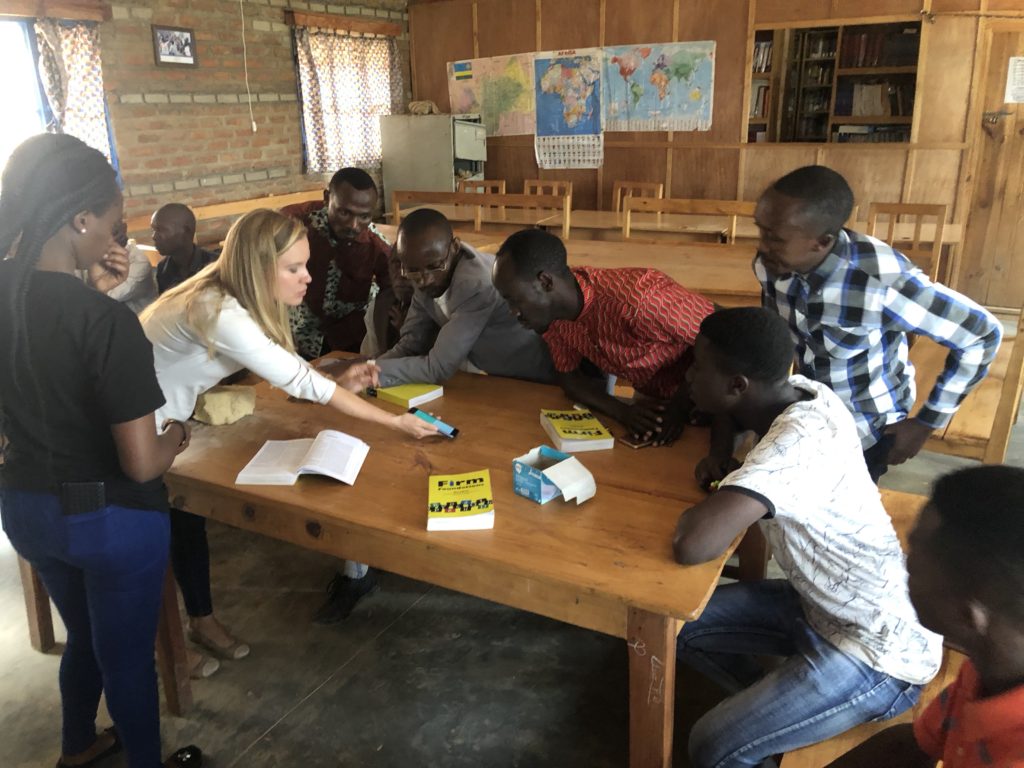
The UN estimates that there are over 80 million people around the world who have been forcibly displaced from their homes. Even more live in states of economic, social and political instability. While asylum-seekers wait for their claims to be processed, they reside in detention centers with no entitlement to the freedom of movement, residency, citizenship, or work. They usually have no available money — savings are often inaccessible or spent on transit. Work is frequently exploitative; refugees are often grotesquely underpaid or not paid at all. Being rendered stateless is a form of absolute vulnerability.
Leaf Global Fintech is working to change the lives of these individuals. The Leaf team is using blockchain technology to democratize financial systems for individuals rendered stateless and excluded from society.
The virtual banking startup was founded by Nat Robinson and Tori Samples after the two met at Vanderbilt University in 2017. They partnered up to participate in the Hult Competition, a social impact-focused challenge in which students brainstorm solutions for some of the world’s most pressing problems. Both Nat and Tori had extensive experience in technology and empowering displaced or underbanked individuals, specifically refugees and migrants, in their previous careers.
One of the biggest problems they observed amongst migrants and refugees is the difficulty of safely storing and transporting cash while in transit. Currently, the process is dangerous, inconvenient, and expensive. Nat and Tori realized that blockchain could be an effective technology to store transaction data in a secure and transparent way while drastically reducing the costs associated with moving small amounts of money across borders. After seeing the impact of digital financial services on underserved populations, they decided to create Leaf.
User Journey
Traditionally, the process of bringing savings across borders and receiving remittances is arduous and often impossible, leaving many individuals without access to capital in their new homes. With Leaf, users are able to create an account on any mobile phone (even non-smartphones) and deposit cash at a local mobile money agent. Mobile money, such as M-PESA in Kenya, is a way of storing money on mobile phones like a branchless mobile-banking system. Agents can accept and disburse cash for customers on every street corner but the money cannot cross borders. Leaf uses this system to move money in and out of Leaf wallets, which are then accessible internationally. After sending mobile money to Leaf, customers can then cross borders without the risk of carrying cash and easily receive and access cash abroad. Once the Leaf wallet is created, friends and family abroad can contribute to it so that the customer has even greater access to funds without waiting in line to pick up physical cash.
Technology
The question still remains: how does Leaf leverage blockchain for its services? Nat Robinson describes:
“Leaf uses the Stellar distributed ledger to store transactions and facilitate the movement of money across borders. Blockchain helps dramatically reduce transaction costs, improve security, facilitate instantaneous transactions, and enhance transparency as a back-end system. Value is not held in speculative cryptocurrency, eliminating the risk of volatility. Customers access Leaf through a smartphone application or feature phone (non-smartphone) using USSD, which is similar to a more secure form of SMS. Both trigger actions on Stellar, making Leaf the first to open up the benefits of blockchain in financial services for the 2.4 billion people still using feature phones.”
In simple terms, Leaf layers on top of existing mobile network operators and multi-national aggregators to allow for easy transferability and storage of money across borders.
Early Success
Leaf’s ability to both store and transport the assets of underserved and underbanked communities promotes physical safety and economic identities. After a beta in 2019, the company fully launched in Rwanda, Uganda, and Kenya in September 2020 and is the first blockchain-based financial solution for those without smartphones. Leaf processed over 6,000 transactions for 1,500 customers worth over $40,000 in its first three months of operations. Tanzania and DR Congo are the next two countries on the company’s roadmap, followed closely by expansion into Europe and the UK.
Leaf participated in the 2019 Techstars Accelerator cohort with Western Union and received grant awards from the National Science Foundation (SBIR), SXSW, The Vatican, and the United Nations. Leaf is part of the EcoBank Fintech Fellows program, which can give the company access to 33 countries across Africa. IBM also selected Leaf for its Hyper Protect Program to explore partnership through IBM’s secure key and data management solutions. Technologies and programs like these will help Leaf scale across Africa and subsequently into Latin America and the Middle East.
Most importantly, Leaf is making a profound impact on the lives of refugees and migrants — arriving in a new country with access to capital and the formal economy dramatically improves each individual’s life.
Nat and Tori have recently joined the Berkeley Blockchain Xcelerator, a joint venture by SCET, Blockchain at Berkeley, and BerkeleyHaas, to further the development of their technology and build a network with the Berkeley community of technologists, investors, and students.
Read more about Leaf Global Fintech here.
